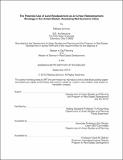| dc.contributor.advisor | Yu-Hung Hong. | en_US |
| dc.contributor.author | Schrock, Melissa (Melissa Alaine) | en_US |
| dc.contributor.other | Massachusetts Institute of Technology. Center for Real Estate. Program in Real Estate Development. | en_US |
| dc.coverage.spatial | n-us--- n-us-ma | en_US |
| dc.date.accessioned | 2013-02-15T14:41:38Z | |
| dc.date.available | 2013-02-15T14:41:38Z | |
| dc.date.copyright | 2012 | en_US |
| dc.date.issued | 2012 | en_US |
| dc.identifier.uri | http://hdl.handle.net/1721.1/77127 | |
| dc.description | Thesis (S.M.)--Massachusetts Institute of Technology, Dept. of Urban Studies and Planning; and, (S.M. in Real Estate Development)--Massachusetts Institute of Technology, Program in Real Estate Development in Conjunction with the Center for Real Estate, 2012. | en_US |
| dc.description | Cataloged from department-submitted PDF version of thesis. This electronic version was submitted and approved by the author's academic department as part of an electronic thesis pilot project. The certified thesis is available in the Institute Archives and Special Collections. | en_US |
| dc.description | Includes bibliographical references (p. 101-104). | en_US |
| dc.description.abstract | The land readjustment method of land assembly has an extensive international history, but is virtually unknown to professional planners and real estate developers in the United States. Its potential benefits are many. It promises to produce efficient development patterns, maximize value creation, minimize population displacement, fund the construction of project-related infrastructure and public facilities and protect the rights of property owners. Decades of experience in Japan and Germany, among other countries, have shown land readjustment to be a flexible tool adaptable to many development scenarios and cultural contexts. As part of a joint effort with planners from the Metropolitan Area Planning Council (MAPC), the regional planning body serving the 101 cities and towns of Metropolitan Boston, this investigation seeks to provide insight into the financial economics of land readjustment and to provide guidance on how the tool could be employed in Massachusetts. A case is made for the use of land readjustment in urban redevelopment scenarios in Massachusetts. As socio-demographic changes put pressure on our urban cores, the need for strategic redevelopment of urbanized areas will be reinforced. The land readjustment mechanism can simultaneously address the needs of affected communities and the development goals of the municipality in a consensus-based environment. This investigation uses the Four Corners area of Dorchester in Boston as a hypothetical case study for land readjustment in an urban redevelopment context. A comparative financial analysis is produced to contrast the net economic benefits created by a conventional piecemeal land assembly with as-of-right development to those created by a comprehensive land readjustment process through which community development goals are achieved. The investigation concludes with a discussion of the distribution of these economic benefits. The financial analysis tool created by the researcher is provided in the accompanying spreadsheet. | en_US |
| dc.description.statementofresponsibility | by Melissa Schrock. | en_US |
| dc.format.extent | 104 p. (some folded) | en_US |
| dc.language.iso | eng | en_US |
| dc.publisher | Massachusetts Institute of Technology | en_US |
| dc.relation.requires | DVD contains copy of thesis in .pdf format. | en_US |
| dc.rights | M.I.T. theses are protected by
copyright. They may be viewed from this source for any purpose, but
reproduction or distribution in any format is prohibited without written
permission. See provided URL for inquiries about permission. | en_US |
| dc.rights.uri | http://dspace.mit.edu/handle/1721.1/7582 | en_US |
| dc.subject | Urban Studies and Planning. | en_US |
| dc.subject | Center for Real Estate. Program in Real Estate Development. | en_US |
| dc.title | The potential use of land readjustment as an urban redevelopment strategy in the United States : assessing net economic value | en_US |
| dc.type | Thesis | en_US |
| dc.description.degree | S.M.in Real Estate Development | en_US |
| dc.description.degree | S.M. | en_US |
| dc.contributor.department | Massachusetts Institute of Technology. Center for Real Estate. Program in Real Estate Development. | en_US |
| dc.contributor.department | Massachusetts Institute of Technology. Center for Real Estate | |
| dc.contributor.department | Massachusetts Institute of Technology. Department of Urban Studies and Planning | |
| dc.identifier.oclc | 825118724 | en_US |

